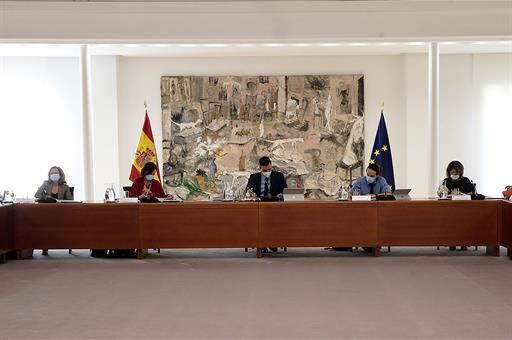Council of Ministers
Government frees up 5 billion euros so that local authorities can respond to needs of their citizens
Council of Ministers - 2020.8.4
Moncloa Palace, Madrid
The Council of Ministers approved a Royal Decree-Law of financial measures, on an extraordinary basis, for local authorities. The new legislation contains the agreement reached on Monday between the Ministry of the Treasury and the Spanish Federation of Municipalities and Provinces, signed on Tuesday at Moncloa Palace, which will free up 5 billion euros for local authorities, thus increasing their income and accordingly their spending and investment capacity without incurring a deficit.
The President of the Government, Pedro Sánchez, stressed at the press briefing after the Cabinet meeting, that stock has been taken of their management and that this agreement will help boost the recovery of municipalities.
Those local authorities that so wish may voluntarily establish a loan in favour of the State for the whole of their treasury surplus. The State will make a non-financial payment for the minimum sum of 35% of the funds contributed, which will increase to a total of 5 billion euros among all participating authorities. In addition, the Treasury will return the whole amount of the loan in a period of 10 years as from 2022.
Hence, local councils will receive the full return of their surpluses and will be able to also draw on an additional disbursement of 5 billion euros between the years 2020 and 2021. The government aims to speed the transfer of these resources to local authorities to tackle the effects caused by COVID-19 as early as possible.
Local authorities will have until 15 September 2020 to convey their firm, binding and inalienable commitment to transfer their treasury surplus. The government undertakes to pay out 2 billion euros from the fund corresponding to 2020 by 15 October.
By using this formula, local authorities may allocate the resources that the State will transfer to them to increase services for the elderly, those in long-term care or with a disability; strengthen the system for home help and working from home; improve care services for victims of gender-based violence, build and fit out nursery schools for those up to the age of 3, increase the offer of rental properties at affordable prices and approve cultural promotion policies.
In addition, the agreement provides that the Treasury will not demand compliance with the spending rule by local authorities for 2020. Furthermore, it provides for the creation of a fund with a provision of 275 million euros, which may be increased to 400 million so that local authorities can offset the deficit from their transport services deriving from the state of emergency.
Extension of social and economic measures to combat COVID-19
 The Royal Decree-Law extends the consideration as a professional contingency deriving from an accident at work for those diseases suffered by staff that provide a service at health centres or day-care centres as a result of the spread of the SARS virus. This extension is applicable as from 1 August 2020 until the health authorities lift all the preventive measures adopted to tackle the health crisis caused by COVID-19.
The Royal Decree-Law extends the consideration as a professional contingency deriving from an accident at work for those diseases suffered by staff that provide a service at health centres or day-care centres as a result of the spread of the SARS virus. This extension is applicable as from 1 August 2020 until the health authorities lift all the preventive measures adopted to tackle the health crisis caused by COVID-19.
Furthermore, the application of zero VAT on intra-Community deliveries, imports and acquisitions of essential health material to combat COVID-19 will be extended until 31 October 2020. The decision affects health products to be delivered to public enterprises, clinics and hospital centres or private institutions of a social nature.
Measures to improve energy efficiency in buildings
 The government has approved the terms and conditions of the Energy Rehabilitation Programme for Buildings (Spanish acronym: PREE), which will allocate 300 million euros in direct aid to enhance the energy efficiency of buildings built prior to 2007.
The government has approved the terms and conditions of the Energy Rehabilitation Programme for Buildings (Spanish acronym: PREE), which will allocate 300 million euros in direct aid to enhance the energy efficiency of buildings built prior to 2007.
The subsidised actions are aimed at improving the thermal enclosure of buildings, the efficiency of thermal installations - heating, air conditioning and the production of domestic hot water - and lighting installations.
The amount of the aid will be 35% of the cost of the action, except for lighting improvements, which will be 15%. On fit-outs of individual properties, this will stand at 25% for their thermal enclosure and for thermal efficiency, and 15% for lighting.
These subsidies may be applied for by owners' associations, renewable energy associations and citizen energy associations, whether natural or legal persons, groups of building owners, operating companies, tenants associations and building concessionaires, energy service companies or providers and local authorities.
The 300 million euros will be distributed according to the target criteria of the number of primary residences registered in each autonomous region or city. Subsequently, these will put out a round of proposals for the subsidies, and hence the presentation of applications will depend on the terms established by each of them. At any event, the deadline may never go past 31 July 2021.
Individual meters
The Council of Ministers also regulated the installation of individual meters in buildings with central heating and refrigeration systems, in compliance with EU legislation.
The main aim is to improve energy performance in buildings, based on individual consumption, such that each user of the building only pays for the amount they consume, to thus optimise energy use, guarantee suitable comfort levels, avoid unnecessary costs and reduce the building's carbon footprint.
On a general basis, the new legislation will apply to buildings with heating or refrigeration systems built prior to the approval of the Thermal Installations in Buildings Regulation 1998, but specific requirements and exemptions are established with the aim of ensuring that the installation only takes place in those cases in which this is economically and technically viable. The schedule for compliance will be progressive and it will not be necessary to complete the installation this winter 2020-2021.
Regulation of VAT on cross-border electronic commerce
The government approved a Draft Law to transpose EU Directives on VAT on electronic commerce, of mandatory application as from 1 January 2021.
The aim is to generally apply the principle of tax imposition at destination in cross-border VAT transactions. Accordingly, the sale of goods and the provision of services online by EU consumers, which are shipped or provided by business owners or professionals from another Member State or a third country will be subject to VAT in the Member State that receives the goods or at the establishment of the recipient.
Another new feature is that the business owner will not need to register in each Member State where the goods are delivered or the services provided, but must simply identify itself to the tax authority of the country where it is established, where they will deposit the VAT. This country will ensure that the tax collected arrives in the State where it is consumed.
Aid and subsidies
40 million euros for production of feature films
The government has authorised the Film and Audio-visual Arts Institute (Spanish acronym: ICAA) to put out a round of proposals for General aid for the production of feature films based on projects, with a provision of 40 million euros. A new feature, to tackle the impact of COVID-19 on the sector, is that beneficiaries may receive a higher percentage of the aid in the first payment - 40% - to allow them to have more liquidity available and thus facilitate the commencement of the production phase.
30 million euros for international development cooperation
As regards cooperation, the government will allocate almost 30 million euros to international projects through the Spanish Agency for International Development Cooperation (Spanish acronym: (AECID). On the one hand, a Royal Decree has been approved that regulates direct subsidies, for the sum of 4.74 billion euros, to 12 institutions. On the other hand, the round of proposals for aid has been authorised for Non-governmental Development Organisations, for the year 2020, for a maximum sum of 25 million euros.
27 million euros for biomedical research and health sciences
The Council of Ministers authorised the Carlos III Health Institute (Spanish acronym: (ISCIII) to put out a round of proposals for subsidies for the ISCIII Platforms to Support R&D+i in Biomedicine and the Health Sciences, as part of the implementation of the Health Action Strategy 2017-2020.
Specifically, the round of proposals will finance three platforms with more than 27 million euros, to be implemented over the next three years. Its aim is to increase their capacity, incorporating new scientific and technical services, and to update their technologies, such that they can compete, with better guarantees, in the new European Union programme "Horizon Europe".
7.6 million euros for animal and plant health
On crop and livestock farming, the government has approved the distribution among the autonomous regions and cities of 7,679,764.26 euros for the prevention and fight against pestilence and the eradication of animal diseases. These funds have been distributed according to objective criteria and agreements established at the Sector Conference on Agriculture and Rural Development on 23 July
New professional qualifications
In the field of education, the Council of Ministers approved the updating of the National List of Professional Qualifications (Spanish acronym: CNCP) through the creation of five new qualifications in the group of Textile, Clothing and Leather Professions (Basic clothing and leather operations, Clothing cuts, Shoe cuts and leather goods, Artisanal embroidery operations and Clothing patterns), and the adaptation to new technologies of pre-existing qualifications - Wood preparation and Organisation and management of production in furniture and carpentry industries, both under the group of Wood, Furniture and Cork Professions
Non official translation





